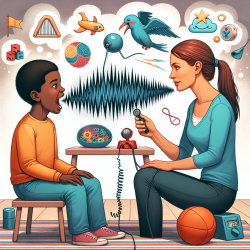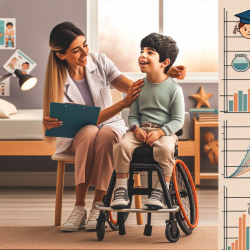Introduction
As the world becomes increasingly digital, the realm of therapy and rehabilitation is not left behind. Telerehabilitation has emerged as a vital tool, especially in the context of the COVID-19 pandemic, offering a lifeline for those with communication disorders. This blog delves into the insights from the research paper "Rigorous Qualitative Research Involving Data Collected Remotely From People With Communication Disorders: Experience From a Telerehabilitation Trial" to help practitioners enhance their skills and explore new research avenues.
The Importance of Inclusion
Communication disorders affect millions worldwide, yet their representation in research is often lacking due to the complexities involved in data collection. The paper highlights the ethical and methodological challenges of including individuals with disorders like aphasia in research. It emphasizes that excluding these individuals can lead to "evidence-biased care," underscoring the necessity of adapting research methodologies to be inclusive.
Adapting Research Methodologies
For practitioners, the key takeaway is the need to adapt research methodologies to ensure inclusivity. This involves training in supportive communication techniques and employing tools that facilitate participation, such as video conferencing and screen sharing. The research underscores the importance of tailoring communication to meet the needs of participants with communication disorders, ensuring their voices are heard and their experiences are accurately represented.
Remote Data Collection: Challenges and Solutions
Remote data collection presents unique challenges, such as the lack of non-verbal cues and the potential for participant fatigue. However, the research offers solutions, including the use of shorter, more frequent sessions and the incorporation of visual aids to support communication. Practitioners are encouraged to engage in reflexivity, continually assessing and adapting their approaches to overcome these challenges.
Practical Recommendations
- Include patient partners with communication disorders early in the project development process to ensure communicative accessibility.
- Train investigators in supportive communication techniques, especially in virtual settings.
- Use triangulation to enhance the credibility of qualitative research, supplementing verbal data with non-verbal cues.
- Ensure participants have access to quality equipment and offer training if needed.
- Adapt questionnaires to be aphasia-friendly and use screen sharing to facilitate understanding.
Conclusion
The transition to remote data collection in rehabilitation research is not just a necessity but an opportunity to innovate and improve inclusivity. By implementing the strategies outlined in the research, practitioners can enhance their skills and contribute to more equitable and effective research outcomes. For those interested in delving deeper into the methodologies and findings, the original research paper is available for further reading.
To read the original research paper, please follow this link: Rigorous Qualitative Research Involving Data Collected Remotely From People With Communication Disorders: Experience From a Telerehabilitation Trial.










